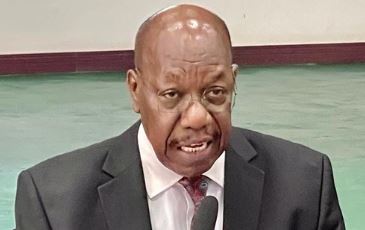The Revitalized Joint Monitoring and Evaluation Commission (RJMEC) has reiterated its call for the Transitional National Legislative Assembly (TNLA) to consider amending the recently passed National Security Service (NSS) Act to create civic and political space across the country.
RJMEC Chairperson Amb. Gen. Charles Tai Gituai appealed on Wednesday during the presentation of the RJMEC quarterly report on the implementation of the peace agreement to the parliament.
“Participate in creating an enabling civic and political space including by considering amending the NSS Act to address the contentious provisions on arrests without warrants and detention of suspects,” he counseled.
The passage of the bill in July by parliament generated public outcry with members of civil society and human rights groups raising concerns on sections 54 and 55 which grant the NSS powers to arrest without warrant.
Interestingly, before the passage of the bill, President Salva Kiir and First Vice President Dr. Riek Machar had agreed to delete the two sections that allow arrests without warrants.
Regarding the status of implementation of the Revitalized Agreement on the Resolution of the Conflict in South Sudan (R-ARCSS), Amb. Gituai told the House that there is a “need for a sense of urgency, prioritization, focus and deliberate demonstration of practical implementation of the Agreement tasks within timelines.”
While giving Chapter-by-Chapter updates on the status of implementation of the R-ARCSS, he underscored that two years is a very short time, it cannot be business as usual and much remains to be done if free, fair, and credible elections have to be conducted by December 2026, under a permanent constitution as envisaged in the Agreement.
He added that is imperative that the unity government the TNLA and all stakeholders work to complete the pending tasks of the Agreement, particularly, those related to the permanent constitution-making, electoral preparations, unification of the forces, and transitional justice.
“At the same time, further opening up of civic and political space cannot be overemphasized, to provide an enabling environment for political participation by the general public, especially in the constitution-making and election processes,” Amb. Gituai stressed.
In his briefing given under Article 7.9 of the Revitalised Peace Agreement, Amb. Gituai urged the Assembly to enhance its effectiveness in discharging its oversight responsibility and to prevail on the RTGoNU to adhere to the agreed implementation schedule, provide funding, and ensure accountable and transparent utilization of allocated resources.
Additionally, the Chairperson called on the Parties to the Agreement to embrace the Tumaini Initiative as a means of bringing in the holdout groups, in the spirit of compromise, inclusivity, forgiveness, and reconciliation for the purpose of enhancing a united, peaceful, and prosperous society based on justice, equality and respect for human rights and the rule of law.
In conclusion, Amb. Gituai called on the Parties to the revitalized Peace Agreement to continue engaging in dialogue during this critical period of the extension with a view to implementing the critical outstanding tasks.




